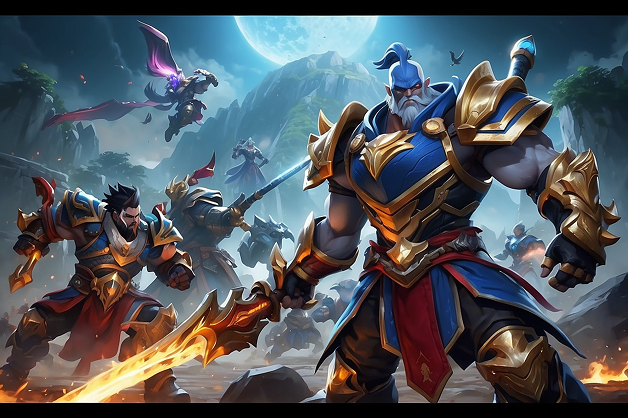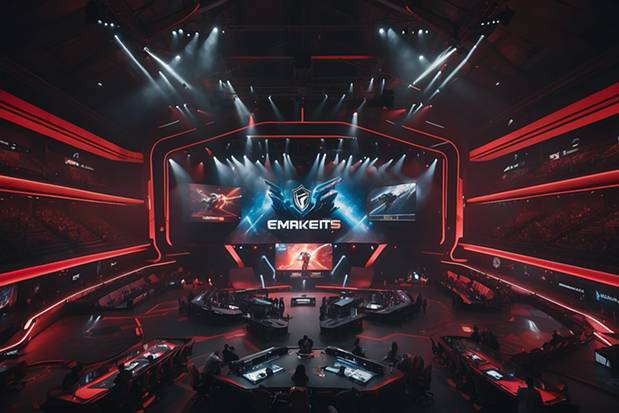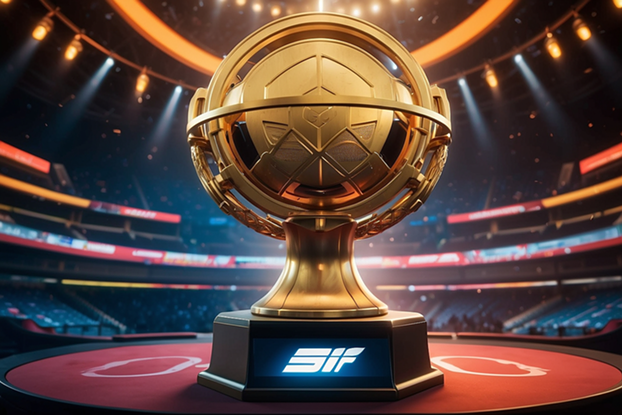In the last few years, the world has witnessed the meteoric rise of esports, a competitive form of video gaming. Esports encompasses structured gaming competitions where skilled professional gamers or teams face off against one another across a range of popular video game titles. These high-stakes tournaments frequently draw live crowds, attract online viewers through live-streaming platforms, and offer substantial cash prizes to the winners.
The Origins of Competitive Gaming
The roots of esports can be traced back to the early days of arcade gaming in the 1970s and 1980s, where players would compete for high scores. As home gaming consoles and personal computers became more accessible, competitive gaming began to evolve. The 1990s saw the rise of local area network (LAN) parties and tournaments, laying the groundwork for the modern esports scene.
The Rapid Growth of Esports
Over the past decade, esports has experienced exponential growth, transforming from a niche hobby to a global phenomenon. This growth can be attributed to several factors, including the increasing accessibility of high-speed internet, the proliferation of streaming platforms, and the growing interest from both players and spectators. Today, esports events can fill massive stadiums, attract millions of online viewers, and offer life-changing prize pools to competitors. As the industry continues to expand, it has caught the attention of mainstream media, traditional sports organizations, and major brands looking to invest in this thriving market.
Popular Esports Games
Esports encompasses a wide variety of video game genres, each with its unique gameplay mechanics, strategies, and fan base. Some of the most popular esports titles include Multiplayer Online Battle Arena (MOBA) games, First-Person Shooter (FPS) games, Battle Royale games, Fighting games, and Sports simulation games.
Multiplayer Online Battle Arena (MOBA) Games
MOBA games, such as League of Legends and Dota 2, are among the most popular esports titles. In these games, two teams of players compete to destroy the opposing team's base while defending their own. Each player controls a unique character with special abilities and must work together with their teammates to outmaneuver and outplay their opponents. The strategic depth, teamwork, and high skill ceiling of MOBA games have made them a staple of the esports scene.
First-Person Shooter (FPS) Games
FPS games, like Counter-Strike 2 and Overwatch, are another pillar of the esports world. These games pit teams against each other in fast-paced, tactical combat scenarios. Players must master their aim, movement, and teamwork to emerge victorious. The intense, action-packed nature of FPS games has made them a favorite among both players and spectators.
Battle Royale Games
Battle Royale games, such as Fortnite and PlayerUnknown's Battlegrounds (PUBG), have taken the gaming world by storm in recent years. In these games, a large number of players are dropped onto a map and must scavenge for weapons and resources while fighting to be the last player or team standing. The unpredictable, high-stakes nature of Battle Royale games has made them incredibly popular among casual and competitive players alike.
Fighting Games and Sports Simulations
Fighting games, like Street Fighter and Super Smash Bros., and sports simulation games, such as FIFA and NBA 2K, also have dedicated esports followings. These games require quick reflexes, precise execution, and deep knowledge of the game mechanics to succeed at the highest levels of play.
What Makes A Successful E-Sports Game?
The rise of esports has been nothing short of remarkable, with competitive gaming growing from a niche hobby to a global phenomenon in just a few decades. However, not every game that hits the market becomes a successful esports title.
Gameplay Depth and Skill Ceiling
One of the most essential factors in determining a game's success in the esports arena is its gameplay depth and skill ceiling. Games that offer a wide range of strategic possibilities, complex mechanics, and room for player expression tend to thrive in the competitive gaming world. A high skill ceiling ensures that players can continually improve and push the boundaries of what is possible within the game, keeping the competitive scene dynamic and exciting.
Regular Updates and Balance Changes
To maintain a healthy competitive environment, game developers must actively support their esports titles with regular updates and balance changes. These updates can introduce new content, such as characters, maps, or items, which keep the game fresh and engaging for players and spectators alike. Balance changes, which adjust the strength and weakness of various game elements, are crucial for ensuring that the game remains fair and competitive. A well-balanced game rewards skill and strategy over exploiting overpowered tactics.
Community Engagement and Support
A strong, dedicated community of players and fans is another key ingredient in the success of an esports title. Games that foster a sense of community, through in-game features, forums, or social media, tend to have a more vibrant and lasting competitive scene. Engaged communities create content, organize events, and provide valuable feedback to developers, all of which contribute to the growth and longevity of the game.
Developer and Publisher Support
The support of a game's developers and publishers is critical for its success in the esports world. Companies that actively promote and invest in their game's competitive scene, through organizing tournaments, providing prize pools, and partnering with esports organizations, help to establish their game as a legitimate esports contender. By nurturing their competitive community, developers and publishers can create a virtuous cycle of growth and engagement that benefits all stakeholders in the esports ecosystem.
Accessibility and Spectator Appeal
Games that are easy to understand and follow for spectators, while still offering depth for dedicated players, have a significant advantage in the esports market. Titles with clear objectives, intuitive gameplay, and exciting moments that can be appreciated by casual viewers are more likely to attract a larger audience. Additionally, games that are accessible to a wide range of players, whether through low system requirements or free-to-play models, have the potential to build a larger player base and, consequently, a larger pool of competitive talent.
Establishing a Sustainable Esports Ecosystem
Ultimately, the key to a game's esports success lies in creating a sustainable ecosystem that benefits all parties involved - players, teams, tournament organizers, sponsors, and the game's developers and publishers. By fostering a healthy competitive environment, supporting the game's community, and continuously improving and evolving the game itself, developers and publishers can establish their title as a long-lasting and thriving presence in the esports world.
Esports Tournaments and Leagues
Esports tournaments and leagues are the cornerstone of the competitive gaming world, providing a platform for the best players and teams to compete, showcase their skills, and earn recognition and prizes. From small, grassroots events to massive, international tournaments, these competitions have played a crucial role in the growth and development of the esports industry.
Major International Tournaments
The esports calendar is packed with high-stakes tournaments that draw the best players and teams from around the world. Some of the most prestigious events include The International (Dota 2), the League of Legends World Championship, the Fortnite World Cup, and the Evolution Championship Series (EVO) for fighting games. These tournaments often feature multi-million dollar prize pools, intense competition, and thrilling moments that keep fans on the edge of their seats.
Regional Leagues and Competitions
In addition to the marquee international events, many esports titles also have thriving regional leagues and competitions. These leagues, such as the League of Legends Championship Series (LCS) in North America, the League of Legends EMEA Championship (LEC), and the Overwatch League, provide a more consistent and structured competitive environment for players and teams. Regional leagues often feed into larger international tournaments, with the best-performing teams earning spots at the most prestigious events.
Online and Offline Events
Esports tournaments and leagues take place in both online and offline settings. Online events allow for greater flexibility and accessibility, enabling players from different regions to compete against each other without the need for travel. However, offline events, often referred to as LAN (Local Area Network) events, are the true highlights of the esports calendar. These live, in-person tournaments take place in large venues, such as sports arenas or convention centers, and offer a unique atmosphere and experience for both players and spectators. The energy and excitement of a live esports event are unmatched, with thousands of passionate fans cheering on their favorite players and teams.
Professional Esports Players and Teams
At the heart of the esports industry are the talented and dedicated professional players and teams who compete at the highest levels of their chosen games. These individuals and organizations have transformed their passion for gaming into a career, devoting countless hours to training, strategizing, and perfecting their craft.
The Life of a Professional Esports Player
Being a professional esports player is a demanding and rewarding career that requires a unique combination of skill, dedication, and mental fortitude. Players often spend hours each day practicing their game of choice, honing their mechanics, and developing new strategies. In addition to individual practice, players also participate in team training sessions, where they work on communication, coordination, and teamwork. The life of a pro player is not all about gaming, however; they also need to maintain a healthy lifestyle, manage their time effectively, and engage with their fans and the wider esports community.
Famous Esports Players and Their Achievements
The esports world has its share of superstars – players who have achieved incredible feats and become household names among fans. Some of the most famous esports players include Lee "Faker" Sang-hyeok, a South Korean League of Legends player widely regarded as the greatest of all time; Johan "N0tail" Sundstein, a Danish Dota 2 player who has won multiple championships and earned over $7 million in prize money; and Kyle "Bugha" Giersdorf, an American Fortnite player who won the 2019 Fortnite World Cup at just 16 years old. These players, and many others like them, have become role models and inspirations for aspiring esports professionals around the world.
Top Esports Organizations and Their Roles
Behind every successful esports player is a strong organization that provides support, resources, and opportunities. Some of the most prominent esports organizations include FaZe Clan, Team Liquid, Cloud9, and Fnatic. These organizations often field teams across multiple esports titles, providing players with salaries, training facilities, and marketing and branding support. Esports organizations also play a crucial role in the industry by creating content, organizing events, and partnering with sponsors and investors to drive the growth and development of competitive gaming.
Esports Ecosystem and Industry
The esports industry is a complex and rapidly evolving ecosystem that encompasses a wide range of stakeholders, from game developers and publishers to tournament organizers, streaming platforms, and media outlets.
Game Developers and Publishers
At the foundation of the esports ecosystem are the game developers and publishers who create and maintain the titles that become competitive gaming sensations. These companies, such as Riot Games (League of Legends), Valve (Dota 2, Counter-Strike 2, and Blizzard Entertainment (Overwatch), play a crucial role in the esports industry by designing games with compelling gameplay, regular updates, and support for competitive play. In many cases, game developers and publishers also organize and sponsor their own esports leagues and tournaments, such as the League of Legends World Championship or the Overwatch League.
Tournament Organizers and Event Production
Third-party tournament organizers and event production companies are another essential component of the esports ecosystem. These organizations, such as ESL, DreamHack, and Major League Gaming (MLG), are responsible for planning, executing, and broadcasting esports competitions. They work closely with game developers, players, teams, and sponsors to create high-quality events that showcase the best of competitive gaming. As the esports industry has grown, tournament organizers have played an increasingly important role in professionalizing and standardizing the competitive gaming experience.
Streaming Platforms and Content Creation
Streaming platforms have been instrumental in the growth and popularity of esports. These platforms allow fans to connect with their favorite players and teams and engage with the wider gaming community. In addition to tournament coverage, streaming platforms also host a wide range of gaming-related content, including player streams, analysis shows, and behind-the-scenes footage. Many professional esports players and organizations also use streaming platforms to create their own content, build their brand, and connect with their fans.
Esports Marketing and Sponsorships
Sponsorships and marketing partnerships are a vital source of revenue for the esports industry. As the audience for competitive gaming has grown, so too has the interest from brands looking to reach this valuable demographic. Esports sponsorships can take many forms, from product placement and branded content to naming rights for tournaments and teams. Some of the most prominent sponsors in the esports industry include endemic brands like Intel, Nvidia, and Logitech, as well as non-endemic brands such as Coca-Cola, Mercedes-Benz, and State Farm.
Esports Media and Journalism
As the esports industry has matured, a thriving ecosystem of media outlets and journalism has emerged to cover the latest news, trends, and stories in competitive gaming. Esports media ranges from dedicated news sites and blogs to mainstream publications that have begun to cover esports as a legitimate sport. Esports journalists play a crucial role in providing in-depth coverage of tournaments, players, and teams, as well as investigating important issues and trends in the industry. The growth of esports media has helped to legitimize competitive gaming and bring it to a wider audience.
Monetization and Prizes in Esports
The esports industry has seen tremendous growth in recent years, with revenues and prize pools reaching unprecedented levels. As the popularity of competitive gaming continues to rise, so too do the opportunities for monetization and financial rewards for players, teams, and organizations.
Revenue Streams in Esports
Esports monetization comes from a variety of sources, each contributing to the overall financial ecosystem of the industry. Some of the primary revenue streams include:
- Sponsorships and Advertising: Brands and companies looking to reach the highly engaged esports audience often sponsor teams, players, tournaments, and leagues. This can include product placements, branded content, and traditional advertising.
- Media Rights: As esports viewership continues to grow, media companies and streaming platforms are willing to pay significant amounts for the rights to broadcast and distribute esports content.
- Ticket Sales and Merchandise: Live esports events generate revenue through ticket sales, while teams and organizations can earn money by selling branded merchandise to their fans.
- In-Game Purchases and Digital Goods: Many esports titles feature in-game economies where players can purchase virtual items, skins, and other digital goods. A portion of these sales often goes to support esports tournaments and prize pools.
The Scale of Esports Prize Pools
One of the most impressive aspects of esports monetization is the staggering size of prize pools for top-tier tournaments. In recent years, esports prize pools have routinely surpassed those of traditional sports, with some events offering tens of millions of dollars in prizes.
For example, the 2019 Fortnite World Cup had a total prize pool of $30 million, with the solo champion taking home $3 million. Dota 2's The International has consistently broken records for the largest esports prize pool, with the 2021 event featuring a pool of over $40 million.
These massive prize pools not only provide life-changing rewards for top players but also help to legitimize esports as a serious and lucrative career path.
The Role of Betting in Esports
Betting has become an increasingly significant part of the esports ecosystem, with many fans and spectators enjoying the added excitement and stakes of placing wagers on matches and tournaments. Esports betting can take many forms, from traditional sportsbook-style betting on match outcomes to more complex prop bets and fantasy esports.
As the esports betting market has grown, so too has the need for regulation and oversight to ensure fair play and protect against fraud and manipulation. Many countries and jurisdictions are still in the process of developing legal frameworks and guidelines for esports betting.
It's important to note that while betting can add an extra layer of engagement and excitement to the esports viewing experience, it also carries risks and should be approached responsibly. Esports fans and bettors should always prioritize responsible gaming practices and be aware of the potential downsides of excessive or uncontrolled betting.
Spectating and Engaging with Esports
Esports is not just about the players and teams competing at the highest levels; it's also about the millions of fans who tune in to watch, cheer, and engage with their favorite games and personalities. Spectating and engaging with esports has become an increasingly popular pastime, with fans from around the world coming together to celebrate the excitement, drama, and skill of competitive gaming.
How to Watch Esports (Online and In-Person)
One of the most popular ways to spectate esports is through online streaming platforms like Twitch and YouTube Gaming. These platforms allow fans to watch live broadcasts of tournaments, league matches, and player streams from the comfort of their own homes. Many esports events also offer live ticket sales, giving fans the opportunity to experience the thrill of competitive gaming in person. Attending a live esports event is a unique and unforgettable experience, with the energy of the crowd, the skill of the players, and the production value of the show all coming together to create an electrifying atmosphere.
Understanding Esports Commentary and Analysis
To fully appreciate the nuances and strategies of high-level esports play, it's important to have a basic understanding of the game being played and the role of commentators and analysts. Esports commentators, often referred to as "casters," provide play-by-play commentary and color analysis during matches, helping viewers follow the action and understand the significance of key moments. Analysts, on the other hand, offer more in-depth insights into team strategies, player performances, and meta-game trends. By familiarizing themselves with the terminology and conventions of esports commentary, fans can deepen their understanding and enjoyment of competitive gaming.
Engaging with Esports Communities and Forums
One of the most rewarding aspects of being an esports fan is the sense of community and shared passion that comes with it. Esports communities and forums provide a space for fans to connect with one another, discuss their favorite games and players, and share their own experiences and insights. These communities can take many forms, from official game forums and subreddits to fan-run discords and social media groups. By engaging with these communities, fans can find like-minded individuals, stay up-to-date on the latest news and developments, and contribute to the vibrant culture of esports fandom.
Fantasy Esports
Fantasy esports have become increasingly popular ways for fans to engage with competitive gaming. Fantasy esports, similar to traditional sports fantasy leagues, allow fans to create their own virtual teams of professional players and compete against other fans based on the real-world performance of those players.
The Future of Esports
As we've seen throughout this article, esports has already come a long way from its humble beginnings as a niche hobby to a global phenomenon that attracts millions of players, fans, and investors. But what does the future hold for competitive gaming?
Trends and Predictions for the Industry
One of the most significant trends in esports is the increasing involvement of traditional sports teams, leagues, and investors. As the popularity and profitability of esports continues to grow, more and more sports organizations are looking to get in on the action, either by acquiring existing esports teams, starting their own franchises, or partnering with established players in the industry. This trend is likely to continue in the coming years, leading to greater professionalization, stability, and mainstream acceptance for esports.
Another key trend is the ongoing globalization of esports, with new markets and regions emerging as major players in the industry. While North America, Europe, and Asia have traditionally been the main hubs of esports activity, other regions like South America, the Middle East, and Africa are beginning to develop their own thriving esports scenes. As esports continues to expand globally, we can expect to see more cross-cultural collaboration, competition, and innovation in the industry.
Challenges and Opportunities for Growth
Despite its rapid growth and increasing mainstream acceptance, the esports industry still faces a number of challenges and obstacles. One of the biggest challenges is the issue of player welfare and sustainability, with concerns around burnout, mental health, and career longevity becoming increasingly prominent in the industry. As esports continues to professionalize, it will be important for stakeholders to prioritize the well-being and long-term success of players, through initiatives like standardized contracts, health and wellness resources, and career development support.
Another challenge facing the esports industry is the need for greater diversity and inclusion, both in terms of the players and personalities involved and the games and genres represented. While progress has been made in recent years, there is still a significant gender and racial imbalance in esports, with women and people of color being underrepresented at the highest levels of competition. Addressing these disparities and creating a more welcoming and accessible esports ecosystem will be crucial for the long-term growth and sustainability of the industry.
At the same time, the challenges facing esports also present significant opportunities for innovation and growth. The development of new technologies like 5G networks and virtual reality could open up new possibilities for esports competition, spectatorship, and immersion. The increasing interest in esports from brands, advertisers, and media companies could lead to new revenue streams and partnership opportunities for players, teams, and organizers. And the growing recognition of esports as a legitimate career path could attract new talent and investment into the industry, driving further growth and innovation.
Esports in Education and Career Opportunities
One particularly exciting area of growth for esports is in the realm of education and career development. As the industry continues to mature, there is a growing demand for skilled professionals in areas like event production, marketing, game design, and player management. Many universities and colleges are now offering esports-related courses and programs, providing students with the knowledge and skills needed to pursue careers in the industry. Some schools are even establishing their own esports teams and facilities, creating new opportunities for student-athletes to compete and learn at the highest levels.
Moreover, the growth of esports is also creating new entrepreneurial and creative opportunities for individuals looking to make their mark on the industry. From starting their own teams and organizations to developing new games and platforms, the esports ecosystem is ripe with potential for innovation and disruption. As the industry continues to evolve and mature, we can expect to see more and more individuals and companies pushing the boundaries of what's possible in competitive gaming.
Conclusion
Esports is a world of incredible depth, diversity, and potential. Whether you're a casual gamer looking to dip your toes into the world of competitive play, a passionate fan seeking to connect with others who share your love of a particular game or team, or an aspiring professional dreaming of making your mark on the industry, there's never been a better time to explore and engage with the world of esports.
Whether you're a longtime fan or a curious newcomer, there's always more to learn and discover in this fast-paced and ever-evolving industry. So keep exploring, keep engaging, and keep pushing the boundaries of what's possible in the world of competitive gaming. The best is yet to come for esports, and we can't wait to see where this incredible journey takes us next.
For more information email [email protected]








